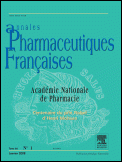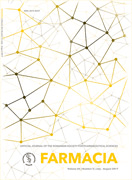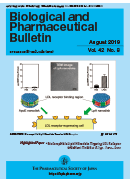
PHARMACIA
Scope & Guideline
Fostering collaboration in the quest for pharmaceutical excellence.
Introduction
Aims and Scopes
- Pharmacological Research and Drug Development:
The journal publishes studies on the discovery and development of new pharmaceutical compounds, including their synthesis, characterization, and evaluation of biological activities. - Clinical Pharmacology and Therapeutics:
Research focusing on the clinical aspects of drug therapy, including efficacy, safety, pharmacokinetics, and pharmacodynamics in various patient populations. - Natural Products and Phytochemistry:
The exploration of natural products for their pharmacological potential, including studies on herbal medicines, phytochemicals, and traditional healing practices. - Formulation Science and Drug Delivery Systems:
Innovations in drug formulation and delivery methods, emphasizing the development of novel drug delivery systems such as nanoparticle-based therapies and transdermal patches. - Public Health and Pharmacoeconomics:
Research addressing public health issues, medication adherence, and economic evaluations of pharmacological interventions to optimize healthcare outcomes. - Regulatory Affairs and Pharmaceutical Legislation:
Studies related to regulatory policies, drug approval processes, and the impact of pharmaceutical legislation on drug accessibility and safety.
Trending and Emerging
- Artificial Intelligence and Machine Learning in Drug Development:
The integration of AI and machine learning methodologies for drug discovery and development, predictive modeling of drug interactions, and optimization of therapeutic strategies is increasingly featured. - Nanotechnology in Medicine:
Research on nanomedicine, including the use of nanoparticles for targeted drug delivery, enhanced bioavailability, and reduced toxicity, is on the rise. - Pharmacogenomics and Personalized Medicine:
Studies examining genetic variations that affect drug metabolism and response, supporting the move towards personalized pharmacotherapy tailored to individual patient profiles. - Telepharmacy and Digital Health Solutions:
The rise of telepharmacy and digital health technologies, especially post-COVID-19, reflects a growing interest in remote patient monitoring and medication management. - Antimicrobial Resistance and Stewardship:
Research addressing the challenges of antimicrobial resistance, including stewardship programs and the development of novel antimicrobials, is increasingly relevant. - Integrative Approaches in Chronic Disease Management:
Emerging studies focus on integrative methods for managing chronic diseases, combining pharmacological treatments with lifestyle interventions and complementary therapies.
Declining or Waning
- Traditional Medicine Studies:
Research related to traditional medicine practices and their efficacy has decreased, possibly due to a shift towards more evidence-based and clinical trial-oriented research. - Chemical Synthesis of Known Compounds:
The focus on the synthesis of already established compounds, rather than novel entities, has waned as the field increasingly prioritizes innovative drug discovery. - Basic Laboratory Studies:
Basic laboratory research without direct clinical implications is less prevalent, as there is a growing demand for studies that translate findings into clinical applications. - Single-Site Clinical Trials:
There has been a noticeable decline in studies that focus on single-site clinical trials, as multi-center and global studies gain preference for their broader applicability and relevance. - In Vitro Studies Without Clinical Correlation:
The number of purely in vitro studies lacking a clear clinical correlation has decreased, as the journal emphasizes research that can demonstrate practical applications in patient care.
Similar Journals

Frontiers in Pharmacology
Driving excellence in pharmacological research and education.Frontiers in Pharmacology, published by FRONTIERS MEDIA SA, stands as a leading open-access journal dedicated to advancing the field of pharmacology since its inception in 2010. With its ISSN 1663-9812, the journal is based in Switzerland and maintains a vital role in disseminating innovative research findings that span various disciplines within pharmacology, including pharmacokinetics, toxicology, and pharmacogenetics. In 2023, Frontiers in Pharmacology has achieved an impressive standing within the scientific community, being ranked in the Q1 category for both general and medical pharmacology, highlighting its critical contribution to the field with a Scopus ranking of #41 out of 272 in medical pharmacology and #76 out of 313 in pharmacology, toxicology, and pharmaceutics, placing it in the 75th and 85th percentiles, respectively. Researchers and practitioners benefit from its open-access model, which ensures widespread accessibility to groundbreaking research, fostering collaboration and innovation across the pharmaceutical sciences. With its commitment to excellence, Frontiers in Pharmacology serves as an essential resource for those looking to explore and contribute to the latest advancements in pharmacological research.

TROPICAL JOURNAL OF PHARMACEUTICAL RESEARCH
Fostering breakthroughs in drug development and application.Tropical Journal of Pharmaceutical Research is an esteemed open-access platform dedicated to advancing the field of pharmaceutical sciences, published by the Pharmacotherapy Group in Nigeria. With an ISSN of 1596-5996 and open access established since 2002, this journal serves as a critical resource for researchers, professionals, and students seeking to disseminate and access high-quality research in both pharmaceutical science and pharmacology. Despite its ranking in the third quartile (Q3) for Pharmaceutical Science and the fourth quartile (Q4) in Pharmacology as of 2023, the journal continues to stand out with its commitment to fostering significant dialogue and innovation in the scientific community. Anchored at the University of Benin, Faculty of Pharmacy, the journal invites contributions that explore novel pharmaceutical research, clinical applications, and drug development, playing a vital role in addressing health challenges that are particularly relevant to tropical regions. Researchers can look forward to publishing their findings in a journal that not only promotes the sharing of knowledge but also enhances the scientific discourse within a rapidly evolving field.

Annales Pharmaceutiques Francaises
Cultivating Insights in Pharmaceutical Science for Future GenerationsAnnales Pharmaceutiques Francaises, an esteemed journal published by MASSON EDITEUR, serves as a pivotal platform in the field of Pharmaceutical Science and Pharmacology. Established in 1945 and continuing through 2024, this journal showcases significant contributions to the advancement of pharmaceutical sciences, bridging the gap between research, development, and practical applications. Although it currently does not offer open access, its established reputation and Q3 ranking in both Pharmaceutical Science and Pharmacology highlight its role in disseminating impactful studies. With an ISSN of 0003-4509, the journal is indexed in Scopus, boasting a respectable percentile ranking for both domains, and remains a vital resource for researchers, professionals, and students dedicated to exploring the latest advancements in the pharmaceutical field. Based in France, at 21 Street Camille Desmoulins, Issy, 92789 Moulinais Cedex 9, it aims to foster a deeper understanding of pharmacological innovations and therapeutic agents among its diverse readership.

FARMACIA
Unveiling Insights in Pharmacotherapy and Beyond.FARMACIA is a renowned academic journal published by the SOC STIINTE FARMACEUTICE ROMANIA, specializing in the field of pharmacology, toxicology, and pharmaceutics. With a rich history dating back to its initial publication years of 1945 to 1946, and ongoing contributions since 2008, the journal has established itself as a significant platform for disseminating cutting-edge research in the pharmaceutical sciences. Indexed in Scopus, it holds a commendable Q2 ranking in the Pharmacology, Toxicology and Pharmaceutics category, reflecting its importance in the field. The journal aims to foster knowledge sharing and innovation among researchers, professionals, and students alike, making it an essential resource for advancing pharmaceutical research. Although it does not currently offer Open Access, the content is accessible to a broad academic audience, ensuring valuable insights into current trends and discoveries in pharmacotherapy and drug development. For those seeking a deeper understanding of the evolving landscape of pharmaceutical sciences, FARMACIA provides a critical lens through which to explore and engage with the latest scientific advancements.

International Journal of Pharmacology
Innovating Insights in Drug Development and SafetyWelcome to the International Journal of Pharmacology, a key publication in the field of pharmacology, published by ASIAN NETWORK SCIENTIFIC INFORMATION (ANSINET). Since its inception in 2006, this journal has provided a vital platform for researchers and professionals to disseminate their findings and insights in pharmacology, toxicology, and pharmaceutics. Despite recent discontinuation in Scopus coverage, the journal's dedication to fostering scientific dialogue continues to attract contributions from esteemed scholars globally. With an **ISSN of 1811-7775** and **E-ISSN of 1812-5700**, the journal seeks to bridge the gap between laboratory research and clinical application, promoting a deeper understanding of drug actions and interactions. Although it operates under traditional access options, the relevance of its published studies to ongoing pharmacological research remains significant.

Istanbul Journal of Pharmacy
Uniting scholars to elevate pharmaceutical discourse.Istanbul Journal of Pharmacy, published by Istanbul University, Faculty of Pharmacy, is a pivotal platform dedicated to the advancement of pharmaceutical sciences and technology. This journal serves as a vital resource for researchers, professionals, and students alike, seeking to disseminate cutting-edge research, reviews, and innovative methodologies within the pharmaceutical discipline. With a commitment to open access, the journal aims to foster a collaborative environment that promotes information sharing and scholarly discourse. The Istanbul Journal of Pharmacy invites submissions that delve into diverse topics ranging from drug formulation to pharmacokinetics, ensuring that readers are equipped with the latest insights and discoveries in the field. This journal is positioned to enhance scientific communication within the pharmaceutical community and support the continuous evolution of pharmacy practice and education globally.

BIOLOGICAL & PHARMACEUTICAL BULLETIN
Fostering Excellence in Biomedical and Pharmaceutical DiscourseBIOLOGICAL & PHARMACEUTICAL BULLETIN, published by the PHARMACEUTICAL SOC JAPAN, is a prominent peer-reviewed journal that serves the fields of medicine, pharmaceutical science, and pharmacology. With an ISSN of 0918-6158 and an E-ISSN of 1347-5215, this publication has been crucial in disseminating innovative research since its inception in 1993, and it continues to contribute significantly to the body of knowledge as it converges towards 2024. Despite being classified as a non-open access journal, it maintains a respectable Q3 ranking in Medicine (miscellaneous) and Q2 in Pharmaceutical Science, highlighting its critical role in advancing scientific discourse in these areas. With Scopus rankings placing it in the 51st percentile for Pharmaceutical Science and 38th percentile for Pharmacology, BIOLOGICAL & PHARMACEUTICAL BULLETIN is an essential resource for researchers, professionals, and students looking to stay abreast of cutting-edge developments and trends in biomedicine and drug development.

Journal of Reports in Pharmaceutical Sciences
Fostering Excellence in Pharmaceutical Science Reporting.Journal of Reports in Pharmaceutical Sciences is a pivotal publication in the realm of pharmaceutical research, disseminating innovative findings that cater to the evolving landscape of pharmacology, toxicology, and biomedical engineering. Published by Wolters Kluwer Medknow Publications, the journal serves as a bridge for scholars and practitioners aiming to enhance their understanding of drug development, therapeutic advances, and biopharmaceutical technologies. With an ISSN of 2322-1232 and E-ISSN 2322-5106, it has established its relevance from 2012 to 2022, occupying notable quartile rankings, including Q3 in Pharmacology, Toxicology, and Pharmaceutics. Despite being categorized in Q4 in some areas, the journal's commitment to quality research ensures it remains a respected platform for disseminating significant insights. Researchers, professionals, and students alike will find this journal an indispensable resource for staying updated on critical advancements in pharmaceutical sciences, making it a go-to source for impactful studies that shape industry practices and academic inquiries.

DARU-Journal of Pharmaceutical Sciences
Bridging research and practice in pharmaceutical sciences.DARU-Journal of Pharmaceutical Sciences is a leading peer-reviewed journal published by SPRINGER INT PUBL AG that focuses on the dynamic and rapidly evolving fields of pharmaceutical sciences, including drug discovery, pharmacology, and toxicology. With an impressive Q2 ranking in both Drug Discovery and Miscellaneous Medicine categories for 2023, this journal stands out as a vital resource for researchers, professionals, and students alike, offering a platform for significant contributions to the scientific community. Covering a comprehensive scope from 2000 to 2024 and indexed by Scopus, the journal ranks within the top percentile in its field, with a ranking of #66/313 in Pharmacology and #34/157 in Drug Discovery, reaffirming its impact and relevance. The journal promotes open access to foster widespread dissemination of knowledge in pharmaceutical sciences, ultimately aiming to bridge the gap between research and clinical applications. For those looking to stay at the forefront of pharmaceutical innovation, DARU represents an invaluable connection to the latest studies and breakthrough findings.

Pharmaceutical Sciences
Exploring innovative solutions in pharmaceutical sciences.Pharmaceutical Sciences, an esteemed journal published by Tabriz University of Medical Sciences, Faculty of Pharmacy, serves as a crucial platform for the dissemination of pioneering research in the fields of pharmaceutical science, pharmacology, and toxicology. With an impact factor reflective of its substantial contribution to the scientific community, this open access journal has been accessible since 2012, ensuring that researchers, professionals, and students worldwide can engage with its rich content. Located in Iran, it has continually evolved, covering research from 2009 to 2024, and boasts impressive rankings in multiple Scopus categories, including Q3 in Pharmaceutical Science and Q2 in Pharmacology, Toxicology and Pharmaceutics. By bridging gaps between scientific inquiry and practical applications, Pharmaceutical Sciences is dedicated to advancing pharmaceutical knowledge and promoting innovative practices that address significant health challenges.